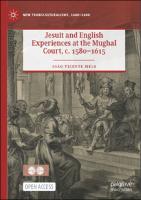Jesuit and English Experiences at the Mughal Court, c. 1580–1615
Author(s)
Melo, João Vicente
Collection
European Research Council (ERC); EU collectionLanguage
EnglishAbstract
This open access book reconstructs and examines a crucial episode of Anglo-Iberian diplomatic rivalry: the clash between the Portuguese-sponsored Jesuit missionaries and the English East India Company (EIC) at the Mughal court between 1580 and 1615. This 35-year period includes the launch of the first Jesuit mission to Akbar’s court in 1580 and the preparation of the royal embassy led by Sir Thomas Roe to negotiate the concession of trading privileges to the EIC, and encompasses not only the extension of the conflict between the Iberian crowns and England into Asia, but also the consolidation of the Mughal Empire. The book examines the proselytizing and diplomatic activities of the Jesuit missionaries, the evolution of English diplomatic strategies concerning the Mughal Empire, and how the Mughal authorities instigated and exploited Anglo-Iberian rivalry in the pursuit of specific commercial, geopolitical, and ideological agendas.


 Download
Download Web Shop
Web Shop